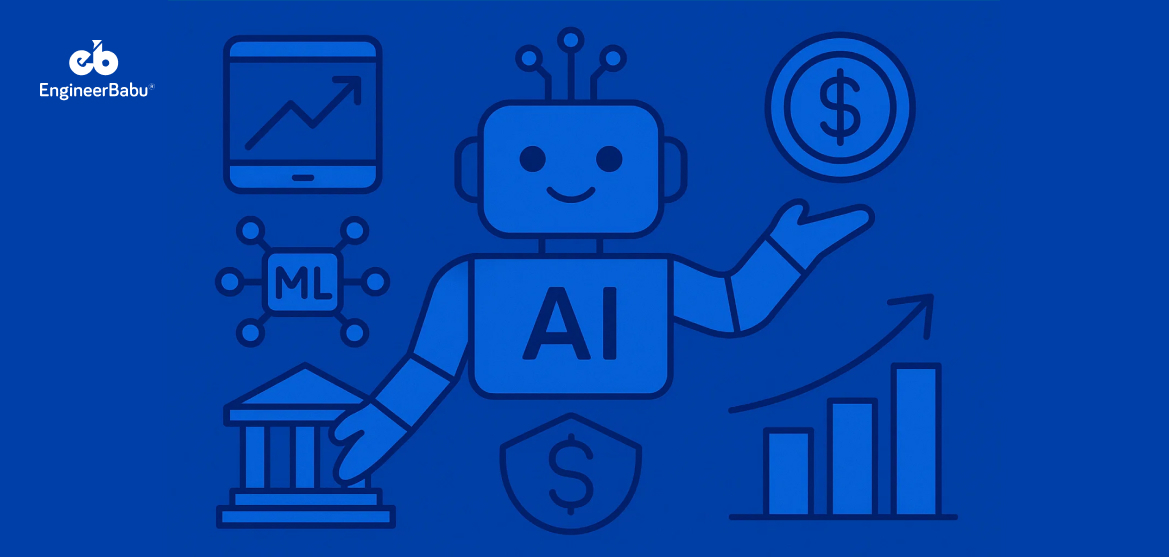Your credit card is swiped in New York, and within seconds, your bank pings you about a suspicious transaction, even though you’re sitting in a café in Mumbai. Moments later, the payment is blocked, your account is safe, and you didn’t lift a finger. This split-second decision wasn’t made by a human fraud officer, it was powered by AI and ML in fintech.
In today’s financial ecosystem, algorithms don’t just crunch numbers, they learn. They recognise patterns, anticipate risks, and personalise financial services with a precision that was unthinkable a decade ago.
No wonder Accenture found that by the end of 2025, AI is projected to automate nearly half of all tasks in financial services. And it will unlock as much as $1.2 trillion in value for the industry.
So, the shift is clear: AI and ML are quietly reshaping how banks, lenders, insurers, and fintech innovators operate. That is why, in this article, we’ll dive deep into real-world use cases and tangible benefits of AI and ML in fintech. Buckle up and let’s dive deep into it.
The Role of AI and ML in Fintech
The financial sector has always revolved around numbers, patterns, and predictions, but until recently, much of that work depended on human speed and judgment. Now, with AI and ML in fintech, those same processes are being executed faster and more accurately.
Key Roles of AI and Machine Learning in Fintech:
- Real-Time Fraud Detection – Continuously monitors transactions to spot unusual behaviour, flag suspicious activity, and prevent losses before they occur.
- Data-Driven Credit Scoring – Uses alternative and traditional data to evaluate creditworthiness, extending access to underbanked customers.
- Algorithmic Trading – Identifies profitable trading opportunities in milliseconds and executes them with high accuracy.
- Personalised Financial Services – Tailors product recommendations, loan terms, and investment strategies based on individual user profiles.
- Automated Compliance and Reporting – Streamlines regulatory checks, audits, and anti-money laundering processes, reducing compliance costs.
- Predictive Risk Management – Anticipates potential defaults, market shifts, or operational risks, allowing proactive decision-making.
By embedding these capabilities into their operations, fintech companies are not only improving efficiency but also creating smarter, more adaptive systems.
Use Cases of AI and ML in Fintech
Artificial intelligence and machine learning are not just reshaping fintech, they’re redefining its core capabilities. From fraud prevention to investment optimisation, here is the breakdown of use cases.
Fraud Detection and Prevention
AI and ML in fintech have transformed fraud prevention from a reactive process to a proactive shield. According to an IBM report, the use of artificial intelligence in finance has boosted fraud detection accuracy for financial institutions by as much as 30%.
Here, transaction data is analysed in real time, with algorithms spotting subtle anomalies that humans might overlook. This means suspicious activities are flagged instantly, and in many cases, blocked before the damage is done.
Credit Scoring and Risk Assessment
Credit risk models today are more dynamic, factoring in both traditional credit histories and alternative data sources like transaction behaviour, utility payments, and even social signals. By applying advanced analytics from AI and ML, fintech companies can offer fairer lending decisions.
The outcome is broader financial inclusion, especially for individuals and small businesses previously overlooked by conventional scoring systems. That too without increasing exposure to defaults.
Algorithmic Trading
In trading environments where milliseconds can determine profit or loss, the speed of AI and ML in fintech offers a critical advantage. Algorithms scan market conditions, news sentiment, and historical patterns to identify optimal trade opportunities.
Unlike human traders, these systems can execute hundreds of decisions simultaneously. Thus, adjusting strategies on the fly as new information comes in. This precision reduces risks while maximising return potential.
Customer Service and Chatbots
AI doesn’t just answer queries, it learns how customers communicate, allowing chatbots to provide highly relevant responses. In fintech, this extends to helping users check account balances, understand investment performance, or even receive tailored product suggestions.
The power of AI and ML lies in delivering assistance that feels human, is available 24/7, and gets better at understanding intent with every conversation.
Personalised Financial Products
Tailoring a product to match individual needs is no longer a luxury, it’s the baseline expectation. Using AI and ML in fintech, institutions can create hyper-personalised loan offers, insurance packages, or investment portfolios based on a user’s behaviour, goals, and risk profile.
These recommendations evolve over time to ensure customers always have access to the most relevant financial products. No wonder the demand for machine learning development services is continuously surging.
Regulatory Compliance and AML Monitoring
Compliance teams can now rely on AI-driven solutions to navigate ever-changing regulations with greater accuracy. In fintech, machine learning algorithms sift through massive volumes of transactions to identify potential anti-money laundering risks.
Instead of manual, time-consuming checks, the system delivers targeted alerts. As a result, this streamlines investigations and frees up human teams for higher-level decision-making.
What are the Benefits of AI and ML in Fintech
The adoption of AI and machine learning in financial services is about delivering measurable value to both institutions and customers. Here’s how these technologies translate into tangible benefits.
Improved Accuracy and Efficiency
AI and ML in fintech have revolutionised accuracy by eliminating the human limitations of speed and scale. Automated systems process vast datasets in seconds, detecting even the smallest anomalies in transactions or credit applications.
This high level of precision minimises false positives in fraud detection. That is why financial institutions often look for professional AI development services to implement models that are fine-tuned to their specific operational needs.
Cost Reduction
By automating repetitive and resource-heavy tasks, financial institutions can dramatically lower operational expenses. Compliance checks, customer onboarding, and transaction monitoring run at scale without requiring proportionally larger teams.
As AI models learn and refine their outputs, these processes become even more efficient over time. This cost efficiency frees up resources for strategic investments in innovation and growth.
Enhanced Customer Experience
Customers now expect faster, more personalised financial services that anticipate their needs. Gen AI in fintech analyzes transaction history, behavioural data, and preferences to craft highly relevant recommendations and responses.
Thus, this creates a seamless experience across digital touchpoints, from mobile apps to online banking platforms. The result is stronger customer loyalty and higher satisfaction scores across the board.
Better Risk Management
Managing financial risk is no longer about reacting to problems after they arise. Advanced models assess both historical and real-time data to predict potential defaults, identify fraud patterns, and flag market volatility before it impacts performance.
The proactive approach strengthens institutional resilience and investor confidence. As a result, risk mitigation strategies are now more accurate, faster, and easier to implement.
Scalability
Traditionally, scaling financial services meant hiring more staff, expanding infrastructure, and increasing costs. AI-driven systems allow institutions to grow their customer base and transaction volumes without a matching increase in operational overhead.
Also, Intelligent automation handles routine tasks while human teams focus on strategy and innovation. This scalability is key for fintech companies aiming for rapid market expansion.
Conclusion
Fintech’s evolution is no longer about digitising traditional processes; it’s about reimagining them with intelligence at the core. AI and ML are enabling financial institutions to predict risks, personalise services, and operate with a level of speed and accuracy that once felt impossible.
As competition intensifies, the winners will be those who adopt these capabilities early and integrate them seamlessly into their products and services.
If your organisation is ready to embrace this shift and lead the market, EngineerBabu can connect you with expert talent to bring your vision to life. Partner with us today to hire fintech developers who can design, build, and scale intelligent solutions that give you a lasting competitive edge.
FAQs
1. Which areas of fintech are seeing the fastest adoption of AI and ML?
The most rapid adoption is happening in digital lending, fraud analytics, robo-advisory platforms, and automated compliance. In digital lending, AI shortens approval times from days to minutes. Fraud analytics use adaptive models that become more accurate with every transaction, and Robo-advisors personalise investment strategies at scale.
2. Can small fintech startups benefit from AI and ML?
With the right strategy, even startups can leverage AI and ML in fintech to analyse customer behaviour, automate onboarding, or offer data-driven lending decisions. Scalable cloud-based tools make it possible to implement these solutions without massive upfront costs.
3. What are the main challenges in adopting AI and ML in fintech?
The biggest hurdles include data privacy concerns, regulatory compliance, lack of skilled talent, and the potential for algorithmic bias. Overcoming these challenges requires clear governance frameworks and investment in experienced AI/ML teams.
4. Is AI expensive to integrate into fintech platforms?
Costs vary depending on the scope and complexity of the project. Many financial institutions partner with a specialised software development company to ensure a cost-effective rollout. Thus, allowing them to start small and expand as results prove valuable.
5. How do AI and ML improve fraud detection in financial services?
AI and ML in fintech use advanced algorithms to scan vast transaction data in real time, identifying patterns and anomalies that could indicate fraud. This proactive detection reduces false positives and prevents losses before they occur.




